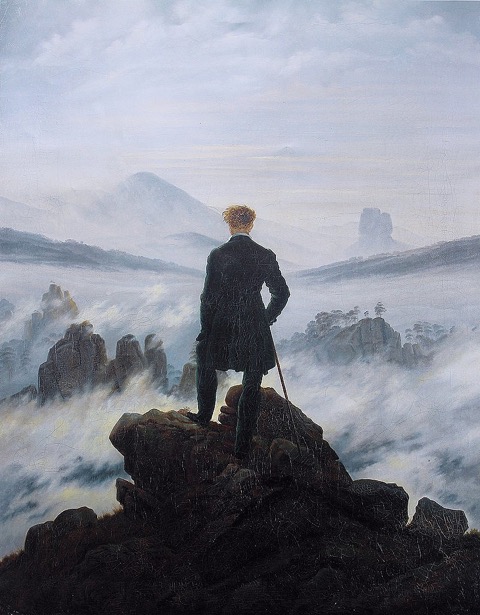-finity

Wanderer above the Sea of Fog by Caspar David Friedrich (1818)
" … hope apparently actually does spring eternal…"
I have never considered myself an atheist, but then, I wouldn't call myself anti-theist, either. I believe in plenty and can recognize the utility embodied in the whole mythology, liturgy and all. I was raised attending a mid-century conservative Christian denomination, demons and all, and learned early of which I was better off not speaking about at all. I could not quite muster up even a half-decent belief in an old testament God, the one that looks like Moses' scowling uncle wearing a swaddling suit of so-called clothes reminiscent of nothing more than a onesie diaper ensemble with sandals; thank God, no socks. Always the sandals. The relationships between God as father and Jesus as the son of God and me as the apparent son of a mild-mannered postal worker and his I Love Lucy wife were about as clear as my father's family tree, swelling with halves and steps and even more baffling progeny. The idea of lord, let alone as savior, escaped me, and not just because I didn't believe, but because I simply could not, since I had not been raised in feudal times, understand the meaning of the terms. Still, I never really felt as if I was entirely on my own, for I always possessed an inner hopefulness, even in my most discouraging times. ©2020 by David A. Schmaltz - all rights reserved
I believe that hopefulness might represent what some more devout and comprehending mean when they speak of big 'G' God. As Richard Rodgers said, "Whenever I feel afraid, I hold my head erect and Whistle A Happy Tune, so no one will suspect I'm afraid." Much of my life seems protected by my inner catalogue of stirring Broadway show tunes. I do not suspect that any higher being's poised to pull me up, out, or through any difficult engagement, but then I've convinced myself that my own agency might prove adequate. I do not subscribe to the notion of a vengeful big or small 'G' god, for I'd at a bare minimum expect a halfway decent mood lability from any respectable deity. An angry god just seems altogether too pissy for me to believe. Wouldn't a creator have better things to do, or a minion or two to dispatch the dirty work? I do seem to possess an innate optimism, though, even though I don't seem to have all that much influence upstairs. I believe that I might just have an adequate measure of influence down here.
You see, I believe in infinity, the fundamental mathematical concept of unimaginably huge. In fact, I believe in multiple infinities, even infinite infinities, some clearly larger than others, but each essentially what's called a perfect market. In a perfect market, no consumption ever meaningfully depletes the stock of fresh raw materials or finished goods. My infinities hold possibilities, chances. Each time I dip into this well of potential, I extract a result. Some disappoint me while others delight me, but encouraged or disappointed, I cannot convincingly ever argue that I'm running short of resource, because, of course, almost as much still remains to be drawn after each drawing. Reducing any infinity by one leaves remaining only a slightly smaller, but not in any way meaningfully reduced infinity. My god is the god of endless second chances. I might not get it quite right the first time, but I might on the second draw. If not on the second draw, then perhaps—but only perhaps—on the third. The possibility for delight, what I suppose the more faithful might refer to as divine intervention, remains essentially intact, ad infinitum, just as long as my own hopefulness remains intact and operative enough to keep me drawing.
I know, this behavior sounds a tad delusional. But under this scenario, hopelessness seems utterly illogical, because, who knows? Because nobody knows, and because nobody could possibly know better. Hopelessness seems the delusional conviction that one's somehow completely depleted the infinite population of impending satisfying outcomes, when a series of disappointing outcomes might more reasonably lead one to conclude that they've upped their chances of drawing a delightful result the next time or, perhaps even more certainly, the time after that. Since it's a perfect market, another opportunity always remains and the likelihood of a positive result never reduces. Not even the most fervent believer insists that their god's always delivering on their prayers. They explain that god possesses infinite wisdom, wisdom far beyond our own to understand, and they seem to maintain their belief regardless of any outcome. God's infinite wisdom seems fundamentally indistinguishable from any infinity's wisdom, beyond our situational comprehension but never providing a good reason for abandoning faith or hope or this fundamental clarity.
The purpose of my belief in infinity might not be any eventual success, though, for extending my hopefulness demands that I do it on spec rather than on any certainty of return. My enduring hopefulness keeps me in the game. Should I abandon hope merely because hope seems to have temporarily or even permanently abandoned me, I've embraced a paradox rather than a reasonable conclusion. 'Abandon all hope, ye who enter here' sounds as innumerate as it seems illogical, for abandoning hope (or believing that hope's abandoned you) fundamentally misrepresents the one property we know for certain every infinity possesses, possibility. We're here atop a chain of intelligent accidents, whether engineered by a big guy in a diaper in the sky or by persistently choosing then choosing again over eons. Both causes seem to reduce to essentially the self-same process accompanied by what I might rather blithely refer to as hope, which apparently actually does spring eternal when engaging with the infinite. Don't get me started on holy. …


